Bangladesh: Post-poll violence leaves one dead, dozens injured; Jamaat cries foul after BNP win
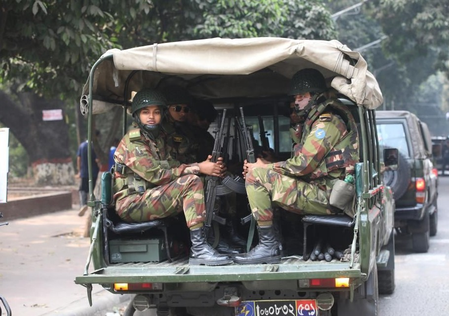
Dhaka, Feb 14 (IANS) With the Bangladesh Nationalist Party (BNP) set to form the next government in Bangladesh following a decisive victory in the 13th Parliamentary election, the radical Islamist party Jamaat-e-Islami alleged that the results in some constituencies were rigged, local media reported.
Addressing a press conference at the party office in Dhaka, Jamaat Chief Shafiqur Rahman claimed that since Friday night, residences of leaders and workers of the Jamaat-led 11-party electoral alliance have come under attack in several parts of the country.
He warned of taking tough measures if these issues are not addressed within a specified time, Bangladesh's leading Bengali daily Prothom Alo reported.
Commenting on the election outcome, Rahman said, "If the result of elections occurs normally, there are usually no major objections. Everyone generally accepts it. But if there is any major discrimination or irregularities, then naturally it raises questions. Despite our positive view yesterday, today, in different parts of Bangladesh, the houses of the workers, supporters, agents and voters of the 11-party electoral alliance are being attacked, individuals are assaulted, houses are being set on fire."
"We have enough observations and objections regarding those who got the majority of seats in the elections; no matter how they got them, they will have to take the responsibility. Peace and order in the country will be maintained - if they form the government, it is their responsibility. But what are these signs now? They have to be stopped now. If they are not stopped yet, we will be forced to make a decision," he added.
At least one person was killed and 36 others injured in post-election violence across Bangladesh between Thursday night and Friday evening, amid allegations of clashes within parties, attacks by rival groups, and vandalism.
During the clash between rival factions affiliated with the BNP in Sadar Upazila of Munshiganj district, a young man was beaten to death, Bangladesh's leading newspaper, The Daily Star, reported.
The deceased, 30-year-old Md Jasim Nayeb, a supporter of an independent candidate and expelled BNP district member secretary Md Mohiuddin, was critically injured in the violence on Friday afternoon and succumbed to his injuries at Dhaka Medical College Hospital in the evening.
According to police, previous disputes between rival groups in the area flared into a violent confrontation over election-related issues, during which Jasim was hit on the head with a sharp weapon, leaving him gravely injured.
With BNP's chairperson Tarique Rahman now set to lead Bangladesh -- experts warn that the nation faces a massive challenge of overcoming the unrest and rising Islamist extremism that marked the 18-month tenure of the Muhammad Yunus-led interim government.
--IANS
scor/sd/
BNP victory sparks hopes of stability, reforms, freedom from graft in Bangladesh
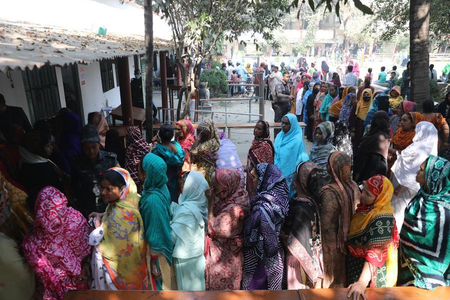
Dhaka, Feb 14 (IANS) Following the Bangladesh Nationalist Party's (BNP's) victory in the general elections, citizens across the country have voiced optimism that Bangladesh is poised to enter a more peaceful phase after months marked by unrest and a worsening law and order situation.
The BNP secured a sweeping mandate in the first general election held since the 2024 student-led protest that brought down former Prime Minister Sheikh Hasina's Awami League government.
In conversations with IANS, several residents expressed hope that the incoming administration would prioritise stability, development and institutional reform.
"The law and order situation is the first priority. If it is established, then everything will go well. I believe this. It is a landmark victory, because before this there were 16 years of broken institutions, corruption and everything. This victory is a good message by the country," one local said.
Another citizen told IANS, "The BNP will now come to power, and we hope that they will carry on good work for the country and improve the conditions here."
Some voices reflected on the broader social fabric beyond party politics.
"A country's beauty doesn't always depend on which party is in power. I think it depends on the culture of the people that they belong to. So, in that respect, I should say that we have a very rich culture and it's not dependent on this or that party. This cultural identity is the main thing for any nation," another resident said.
Congratulating the BNP on its win, another individual said, "We congratulate the BNP. We hope they will lead the country with a secular, inclusive, and independent-minded approach. We expect them to work with everyone and uphold fundamental principles."
Calls for freedom and accountability also featured prominently in public reactions.
"We want a Bangladesh that is conscious of freedom, believes in freedom, and supports freedom," one citizen remarked.
Another said, "We want this country to be free of corruption; we don't want corruption. We have a new government and new hope."
The election is widely seen as a turning point in Bangladesh's political trajectory, coming in the aftermath of the July 2024 mass protests that compelled Hasina to leave the country and seek refuge in India, paving the way for an interim administration led by Muhammad Yunus.
Alongside electing a new government, voters also backed significant constitutional amendments through a parallel referendum. The proposed changes include introducing term limits for prime ministers, establishing a bicameral legislature, and strengthening women's representation -- reforms that were key demands of the youth-led movement.
The BNP has consistently criticised the previous administration over what it described as authoritarian practices and flawed electoral processes, projecting its electoral success as a return of democratic authority to the people.
With the mandate secured, attention now turns to the formidable governance tasks ahead, including economic revival, rebuilding institutions, and responding to the aspirations of Gen Z protestors who played a central role in last year's uprising.
--IANS
sd/rad
India AI Summit key for Global South: Dell Tech

Washington, Feb 14 (IANS) Calling the upcoming India AI Impact Summit a “pretty key, an important event,” Dell Technologies senior executive Vivek Mohindra said the gathering marks a pivotal moment for India and the broader Global South as artificial intelligence reshapes economies and governance.
“This is the first global AI summit to be held in the global south,” Mohindra told IAND in an exclusive interview.
He added that India, with its “huge aspirations,” is convening global leaders “at a pretty key point” to outline not just its own vision but “the role that all of us can play in India achieving its aspirations.”
Mohindra serves as Special Advisor to the Vice Chair and COO at Dell Technologies and has previously held roles, including Chief Strategy Officer. He said he expects “a lot of really rich dialogue and discussion” at the summit, underscoring that “a public-private partnership will be a key enabler”.
Positioning India in the global AI landscape, he said the country is “very well positioned” given its deep talent pool and decades-long strength in IT services and software.
With increasing focus on building AI infrastructure and policy frameworks, he said he is “very excited about India's potential to really seize the opportunity and establish itself as a preeminent driver of AI, not only for its citizens, but also globally”.
Asked about comparisons with other major powers, Mohindra cautioned against framing AI as a zero-sum contest. “That is a much more important discussion rather than a relative discussion of how is one country positioned versus the other,” he said.
He pointed to India’s long-term development plans, investments in infrastructure, access for citizens and small businesses, and governance policies as “really important elements for India to realize the potential for AI for itself”.
On corporate collaboration, Mohindra said public-private partnerships would drive progress as India builds “its own sovereign AI infrastructure”.
Highlighting Dell’s footprint in India, he said the company has been present “for over 30 years,” with India now its “second largest presence” globally in headcount and research and development.
At the summit, Dell plans to unveil a “Dell AI India blueprint”. Mohindra outlined three pillars: “invest, innovate, and evolve”.
“Investments is all around things like infrastructure, having a secure and sustainable energy infrastructure to be able to support the AI infrastructure,” he said, referencing offerings such as the “Dell AI factory”.
“Innovate really revolves around elements like skilling, governance,” he added, while “evolve really revolves around elements related to the regulatory framework”.
On regulation, Mohindra argued for balance and predictability. Companies need “some certainty around regulation so companies can continue to innovate,” he said, advocating “some harmonized regulatory framework that gives companies small and large the certainty of operating within that particular environment”.
Referring to India’s AI governance guidelines released in November 2025, he said the framework contains “seven foundational principles,” including “trust and people first, and fairness and equity and accountability,” and also emphasises “innovation over a screened”.
“I think the current approach the government is taking is pretty well balanced,” he said. On industry-wide challenges, Mohindra cited three recurring issues: identifying the right AI use cases, preparing data for AI, and bridging the “talent and skills gap”.
Companies must also decide whether AI workloads run “in the cloud,” “on prem,” or “on a pc,” each with trade-offs in cost and data control. He added that firms face “the extreme pace of change in this industry and being able to stay on top of it and not be frozen because of the pace of change”.
Mohindra said he is “very excited about the potential for India to leverage this technology for the benefits of its citizens,” adding that Dell is “really excited about bringing forth all of our capabilities to help India achieve its AI aspirations”.
The India AI Impact Summit follows earlier global AI summits held in London, South Korea and France, as countries race to frame policy and governance approaches amid rapid advances in generative AI and computing infrastructure.
--IANS
lkj/pk
AI is India’s ‘next oil’: AMD Exec

Washington, Feb 14 (IANS) Artificial intelligence is at an inflection point globally, and India must treat data as its “next oil” if it wants to lead the next industrial revolution, Sunil Pal, Head of AI GPU Allocation at AMD, said ahead of the India AI Impact Summit in New Delhi.
“2026 is the year for AI,” Pal told IANS, describing the technology wave that began with ChatGPT’s release in 2022 as “like the fourth industrial revolution.”
He said countries are racing to capture value in a market he described as projected to reach $1.7 trillion by 2031.
“Everyone is trying to see how can they capitalise on this overall AI,” he said, adding that “data is the key.”
According to Pal, the summit in India comes at a time when governments and companies worldwide are evaluating how to scale AI infrastructure and applications.
He outlined three areas where India stands out: “AI talent and engineering depth,” a “global digital backbone,” and a shift “from services to strategic innovation hub.”
India offers “one of the largest AI and digital engineering talent pool,” he said, enabling enterprises “to scale AI rapidly and cost-effectively.”
He pointed to the country’s role in managing global enterprise platforms, cybersecurity operations, analytics, and AI development. Indian technology firms, he said, are “brightly positioned to know what the trend is changing, and they can change the trend accordingly.”
India is also evolving “into AI research, product engineering, semiconductor design, and global capability centers,” he said. With “1.2 billion people,” he added, the country has a built-in scale advantage.
But Pal warned that infrastructure will determine whether India can convert that potential into leadership.
“In order to build the data centers, the power is the bottleneck,” he said. “The main thing is the electricity, and high-quality electricity is the key.”
He said governments must think long term and invest in reliable, affordable energy, including hydro, nuclear, wind, and solar power. “It’s not a short-term thing,” he said. Countries need to “look at this holistically and look at the long term and play the long game.”
Building data centers requires large-scale planning, land acquisition, and regulatory approvals. Pal noted that even in the United States, projects require rounds of public consultation and clearances. Similar processes in India will take time.
Still, he emphasised that compute infrastructure is not tied to a single geography. It is “agnostic to a location,” he said, and can be deployed in one part of the country and used elsewhere, or even globally, through the internet.
On global competition, Pal said the United States currently has a stronger lead in AI, but “China is not behind.” He recalled visiting Beijing in 2018 and being struck by the level of automation and AI deployment even then.
China’s approach, he said, reflects a “very concentrated effort.” But he stressed that AI remains in its early stages everywhere. “AI is right now at the beginning,” he said, adding that countries from Singapore to Dubai and across Europe are moving quickly.
For India, the challenge is to stay alert and engaged. “You have to keep your eyes and ears open,” he said, and assess how AI can be integrated into an economy that is already among the world’s largest.
Pal also pushed back against the idea that AI is merely a cost-cutting tool. “It is becoming a revenue enabler through the hyper personalization, through predictive insights and digital business models,” he said.
In healthcare, he explained, AI can narrow down options and accelerate research cycles. Experiments that once required large teams and extended timelines can now be streamlined. “The machines are learning too fast,” he said.
At the same time, he cautioned that data quality matters. “If you provide the bad information, you get the bad information out.”
Looking ahead five years, Pal said he does not have a “crystal ball,” but believes the technology is still in its “infancy stage.” He compared AI’s current moment to the early days of the steam engine, the internet, and the smartphone.
Each of those innovations, he said, reshaped industries and created trillion-dollar companies. AI, in his view, represents a similar turning point.
“If you don’t adopt, you will be behind and you don’t want to be behind,” he said.
Calling the India AI Impact Summit “a good thing,” Pal said New Delhi’s push into semiconductors and digital infrastructure is long overdue. He drew a parallel to oil-rich economies of the 20th century.
“Data is the next oil,” he said. With the right ecosystem, talent and infrastructure, he suggested, India can turn that resource into long-term economic strength.
The India AI Impact Summit follows similar gatherings in London and France and comes as governments worldwide accelerate investments in AI chips, data centers and research. India has rolled out incentives for semiconductor manufacturing and digital infrastructure, aiming to position itself as a major player in the global AI value chain.
As geopolitical competition intensifies over advanced technologies, New Delhi is seeking to leverage its engineering base and digital scale to emerge as a central hub in the next phase of AI-led growth.
--IANS
lkj/pk
Rubbing salt into wounds of oppressed: Sindhi leader on European forums’ invite to Asim Munir
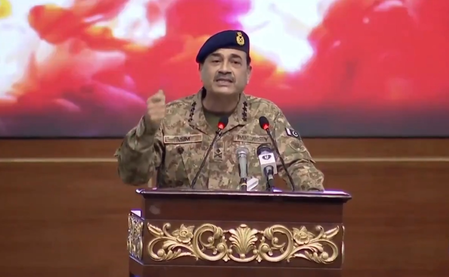
Berlin, Feb 14 (IANS) Shafi Burfat, Chairman of the Jeay Sindh Muttahida Mahaz (JSMM), condemned Pakistani Army Chief Field Marshal Asim Munir’s presence at global security forums across Europe, calling it an insult to the communities facing “repression and occupation” within the South Asian nation.
The Sindhi leader highlighted that Munir has effectively placed Pakistani politics, the judiciary, business, and media under the “shadow of military boots”, and therefore cannot credibly represent peace.
“His presence at global security forums in civilised societies such as Germany and across Europe is an insult to the historical nations that endure repression and occupation within Pakistan. It is tantamount to rubbing salt into the wounds of oppressed peoples,” Burfat said.
“The so-called self-styled Field Marshal and corrupt Army Chief of the unnatural state of Pakistan, Asim Munir, is deeply implicated in the systematic persecution, enforced disappearances, torture, and extrajudicial killings of forcibly subjugated nations within Pakistan, including the Sindhis, Baloch, and Pashtuns,” Burfat posted on X.
“Political activists are abducted, subjected to brutal torture, and their mutilated bodies are discarded as instruments of fear. Gross violations of human rights continue under his command. The same military establishment that has fostered religious extremism and terrorism across the region now seeks legitimacy on international platforms,” he added.
In a letter to the global community, including the United Nations, European Union and international human rights organisations, Burfat raised moral objections to the inclusion of Pakistan’s military leadership at the Munich Security Conference, scheduled from February 13-15.
The invitation to the terror state Pakistan and to Munir, whose record “reflects brutality, corruption, and an authoritarian mindset”, to participate in the Munich Security Conference constitutes a matter of “serious concern, deep sorrow, and grave alarm,” the Sindhi leader wrote.
“Such a decision necessitates careful and principled reflection by the Conference’s organising body and by all responsible international stakeholders associated with this global forum,” he stressed.
Burfat called on the European nations, warning that hosting Munir, accused of “sponsoring extremism and overseeing systematic repression”, undermines the very principles of human rights, justice, and international law that Europe claims to uphold.
“Granting him a platform at global forums contradicts the global commitment to peace, democratic values, and human dignity,” he stated.
Citing numerous human rights organisations, the Sindhi leader stated that enforced disappearances, alleged secret detentions and the discovery of mutilated bodies of political activists have intensified fears among affected communities across Pakistan.
Burfat highlighted that entire regions, including Sindh, Balochistan, and others, continue to report grievances related to political repression, cultural marginalisation, and economic exclusion.
He emphasised that Pakistan’s sheltering of Osama bin Laden significantly damaged the country’s international credibility and raised global concerns regarding counterterrorism commitments.
“This episode remains a central reference point in debates about Pakistan’s security policies and international responsibilities. In light of this historical and political record, it is deeply troubling to many observers that Pakistan’s military leadership is being invited to a forum dedicated to global peace and security,” Burfat noted.
Burfat stated that the Munich Security Conference, which seeks to uphold human dignity and democratic values, must carefully consider the implications of Islamabad’s participation in light of the ongoing human rights abuses by Pakistani forces.
--IANS
scor/sd/
Rights bodies condemn mass disappearance of civilians in Balochistan by Pakistani forces
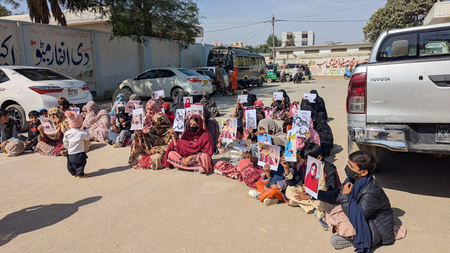
Quetta, Feb 14 (IANS) At least fourteen Baloch civilians were forcibly disappeared by Pakistani forces in Balochistan, according to leading human rights organisations.
Paank, the Baloch National Movement's Human Rights Department, on Saturday, mentioned that 23-year-old Zulfiqar, a resident of Tasp region in Panjgur district of Balochistan, was forcibly disappeared on Friday by a Pakistan-backed armed group.
The rights body also expressed concern over the enforced disappearance of Zakir Noor, a student from Panjgur, by Pakistani state military personnel in Karachi on December 30.
Citing information, Paank stated that Zakir Noor was unlawfully detained without any warrant, legal justification, or due process, while his whereabouts remain unknown, placing his life at serious risk.
“Such actions constitute a grave violation of fundamental human rights, including protection from arbitrary detention and enforced disappearance under international law,” the rights body stated.
Paank expressed serious concern over the continued pattern of enforced disappearances targeting Baloch students and youth across Pakistan, particularly in urban centres like Karachi.
Meanwhile, human rights body Baloch Voice for Justice (BVJ) strongly condemned the enforced disappearance of multiple members of a single family on February 8 during a late-night raid by Pakistani forces in Gulshan Amir Abad region in Hub district.
According to BVJ, Pakistani security forces reportedly detained Abdul Rab, Muhammad Rahim, Abdul Razzaq, and Abdul Malik, four brothers, along with their sons Shahzaib, Jahangir, Noroz, and Shah Mir.
It added that the Pakistani authorities are further accused of taking another Baloch civilian, Dad Shah, from Hub.
Citing family reports, the rights body stated that women and children were subjected to violence during the operation.
“This pattern of collective punishment reflects a continued policy of intimidation and lawlessness in Balochistan. Enforced disappearance is a serious violation of international human rights law. We demand the immediate disclosure of their whereabouts and their presentation before a court. Silence from state institutions only deepens the crisis and erodes public trust,” the BVJ stated.
Highlighting the atrocities across Balochistan, the rights body further revealed the enforced disappearances of three Baloch youths--Ghalib, Afzal, and Yasir Lehri.
BVJ stated that on February 9, Pakistan’s Frontier Corps and Secret Service agencies raided Allangi Mashkai in Awaran district and forcibly disappeared Ghalib, a student who had returned from provincial capital Quetta to attend a family wedding.
In a separate incident on February 10, 26-year-old Yasir Lehri, a police constable and photographer, was abducted by Pakistani Military Intelligence (MI) and Frontier Corps (FC) from Mughalzai Main RCD Road in Kalat district in Balochistan. Additionally, on January 29, 22-year-old Afzal, a driver from the Turbat region in the province, was taken from his home by FC and MI.
“We denounce these unlawful actions in the strongest terms. Enforced disappearance is a grave violation of human rights and international law,” BVJ noted.
--IANS
scor/rs
Indian student missing in Berkeley
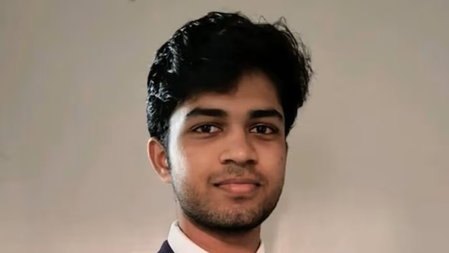
Washington, Feb 14 (IANS) The Consulate General of India in San Francisco has expressed deep concern over the disappearance of a 22-year-old Indian student at the University of California in Berkeley, as local authorities continue search operations in the East Bay area.
"Consulate General of India in San Francisco is deeply concerned about the disappearance of Saketh Sreenivasaiah, an Indian post-graduate student of University of California, Berkeley, hailing from Karnataka," the Consulate said on Friday in a post on social media platform X.
"The Consulate is in touch with the family and also is in contact with the concerned local authorities to locate the student," it added.
According to Berkeley police, a search is underway near Lake Anza for the missing student, who was last seen on Tuesday.
"Saketh Sreenivasaiah, 22, was reportedly upset about a relationship," police said.
His backpack, containing his passport and laptop, was found on a doorstep in the Park Hills neighbourhood next to Tilden Regional Park.
"We are working with EBRPD (East Bay Regional Park District) to coordinate ongoing search efforts," the Berkeley Police Department said.
"We are still asking for the community's help in locating him."
Police said Sreenivasaiah was last seen in the 1700 block of Dwight Way, near McGee Avenue.
He is described as six feet one inches, weighing about 160 pounds, with short black hair and brown eyes.
The police identified him as Indian.
Berkeley police have urged anyone with information about Sreenivasaiah to notify the local law enforcement.
Sreenivasaiah has been pursuing his Master's degree in the Chemical and Biomolecular Engineering department at UC Berkeley, according to his LinkedIn profile.
He previously earned his undergraduate degree from the Indian Institute of Technology Madras, one of India's top engineering institutions.
The case has drawn attention from the Indian diplomatic mission in the United States, with the Consulate coordinating with authorities and the family as the search continues.
--IANS
lkj/khz
Nikhil Gupta’s guilt admission in ‘murder-for-hire’ plot stops airing testimony, evidence in court (Lead)

New York, Feb 14 (IANS) Nikhil Gupta dramatically admitting in a federal court here that he participated in a murder-for hire plot ends the trial against him without testimony from witnesses or the trove of what the prosecutors assert were evidence against him being aired in court.
Gupta, who was accused of plotting against a Khalistani leader, pleaded guilty on Friday to three charges against him -- murder-for-hire, and conspiracies to commit that crime and launder money.
This was a reversal from the stand he took in court in 2024, when he had said that he was not guilty.
Without a trial at which prosecutors present evidence and call up witnesses, which the defence lawyers try to break and present their own side, the case will now go straight to sentencing.
The target of the plot is believed to be Gurpatwant Singh Pannun, although the prosecution has only said that it was “a US citizen of Indian origin” who “is a vocal critic of the Indian government and leads a US-based organisation that advocates for the secession of Punjab” and the creation of a “Sikh sovereign state called Khalistan”.
Gupta made the admission of guilt before Magistrate Judge Sarah Netburn in a fast-moving development in the case, rather than before Judge Victor Marrero, who is presiding over the case.
Magistrate judges do not preside over trials and handle other matters relating to cases, and, therefore, the final disposal of the case with sentencing will go back to Marrero.
The proceedings were held in a small side courtroom and not in the main courtroom where Marrero had presided over the proceedings.
Gupta is being held in the notorious Metropolitan Detention Center (MDC) in Brooklyn, where Venezuela’s former President Nicolas Maduro is also being held.
He was brought from there to the federal court near Wall Street in Manhattan.
He was dressed in the tan jail uniform and was unshackled by US Marshal before ushering him into the court through a side door.
Khalistanis filled the spectator section of the courtroom.
Netburn asked Gupta, “How do you plead to the three counts [or charges]”?
He replied, “Guilty”.
The magistrate judge then asked him, “Tell me what you did”?
Gupta, explaining his guilty plea, said, “In the Spring in 2023, I agreed with another person to murder a person in the US. I delivered $15,000 in cash by phone to a person in the US”.
Before accepting the guilty pleas, Netburn turned to the prosecutors and asked what evidence they had.
One of the assistant federal prosecutors said, “Testimony from a confidential source, an undercover officer who operated as the would-be hitman” and “WhatsApp and text messages, bank records, video of the cash payment made to the undercover agent”.
Marrero is expected to sentence Gupta on May 29, when he could face maximum penalties of ten years in prison for each of the two murder-for-hire charges, and 20 years for the money laundering charge, according to prosecutors.
In most cases where the accused plead guilty, they get lower sentences.
In Gupta’s case, there was no agreement on a deal for lesser punishment as the prosecutors gave the court a letter outlining the maximum penalties prescribed under the law, and he was made aware of it.
The prosecutors said in October that they offered Gupta a plea deal, which lapsed when he did not follow through.
Prosecutors accuse Gupta of working with Vikash Yadav, a former Central Reserve Police Force (CRPF) commandant seconded to the Research and Analysis Wing (RAW).
Prosecutors declared him a co-defendant of Gupta, and Yadav, who is in India out of the reach of US authorities who have filed charges against him here.
The Indian government has denied any involvement in the case and has charged Yadav in 2023 in an unrelated case with extortion and abduction of a businessperson in India.
That case is pending, and in August a Delhi court issued a nonbailable warrant for his arrest.
US officials described Gupta as an “international narcotics and weapons trafficker” who, allegedly, entered the plot to gain leniency from Indian law enforcement.
The US prosecutors allege that Yadav recruited Gupta to orchestrate the murder-for-hire plot, and Gupta approached a person he thought was a criminal to find a hitman.
But the person was in fact a confidential source or informant working with the Drug Enforcement Agency (DEA).
The informant introduced Gupta to an undercover DEA officer telling him that officer was a hitman for hire.
Prosecutors said Gupta agreed in June 2023 to pay the undercover officer $100,000 to carry out the murder.
Yadav and Gupta, prosecutors said, arranged for an associate to give the officer $15,000 as an advance.
The transaction, as well as other interactions between those involved in the plot, were recorded, the prosecutors said, and introduced visuals in the chargesheet.
Gupta was arrested in the Czech Republic and was extradited to the US in June 2024.
--IANS
al/rad
Nikhil Gupta faces up to 40 years in prison for admitting role in NY murder plot

Washington, Feb 14 (IANS) Nikhil Gupta stood in a Manhattan federal courtroom and admitted that he agreed in 2023 to pay $15,000 to have a Sikh separatist leader in New York murdered — a plea that now exposes him to a potential 40 years in a U.S. federal prison.
Appearing before U.S. Magistrate Judge Sarah Netburn in the Southern District of New York, the 54-year-old Indian national pleaded guilty to three charges: Conspiracy to commit murder-for-hire, murder-for-hire, and conspiracy to commit money laundering.
“In the spring of 2023, I agreed with another person to have another individual to murder a person in the United States,” Gupta said under oath. He further admitted that he “had delivered $15,000 in cash via cellular phone to another individual in the United States”.
During questioning, Gupta confirmed that he knew the intended victim was in New York — “In Queens especially,” he told the court — and that the person who received payment was in Manhattan.
Judge Netburn recommended that District Judge Victor Marrero accept the plea, and the district court subsequently issued an order accepting it. Sentencing has been scheduled for May 29, 2026.
Under federal law, Gupta faces statutory maximum penalties of 10 years each for conspiracy to commit murder-for-hire and for murder-for-hire, and up to 20 years for conspiracy to commit money laundering — a combined maximum exposure of 40 years. However, federal sentencing does not automatically default to statutory maximums. Instead, courts rely on the advisory U.S. Sentencing Guidelines to determine a recommended range before considering broader statutory factors.
In a Pimentel letter submitted before the plea, prosecutors calculated Gupta’s advisory Guidelines range at 235 to 293 months, or approximately 19½ to 24½ years in prison. That calculation was based on the offense level applicable to solicitation of murder, enhanced because money was offered in exchange for the killing.
Prosecutors also added a two-level obstruction enhancement tied to what they described as materially false statements in a prior sworn declaration, while noting that Gupta could receive credit for acceptance of responsibility.
The court made clear during the plea hearing that these Guidelines calculations are advisory and that the final sentence will be determined by Judge Marrero after reviewing a Presentence Investigation Report prepared by the U.S. Probation Office. Under federal law, the sentencing judge must weigh factors including the seriousness of the offense, deterrence, protection of the public, and the need to avoid unwarranted disparities.
Prosecutors stated that had the case gone to trial, they would have presented testimony from a confidential source who was solicited to arrange the killing, testimony from an undercover officer posing as a hitman, recorded WhatsApp messages and calls, cellphone evidence, and video of the $15,000 payment made in New York.
The indictment alleged that Gupta worked with others, including a co-defendant identified as an employee of India’s Cabinet Secretariat, which houses the Research and Analysis Wing (RAW), to orchestrate the assassination of a New York-based Sikh political activist advocating for Khalistan.
Gupta confirmed in court that he is a citizen of India and acknowledged that his guilty plea will likely result in removal from the United States. The government’s sentencing letter notes that removal is presumptively mandatory under federal immigration law.
By pleading guilty, Gupta avoided what would have been a diplomatically sensitive trial in Manhattan federal court involving allegations of foreign-directed violence on American soil. The question that now remains is not whether he is guilty — that has been admitted — but how long he will spend behind bars.
Sentencing on May 29 will determine that outcome.
--IANS
lkj/rad
Ashley Tellis indicted on 11 Espionage counts in US Court
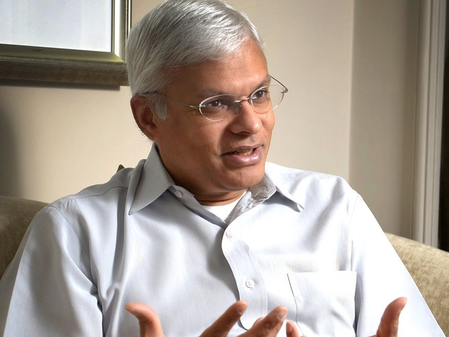
Washington, Feb 14 (IANS) A federal grand jury in Virginia has returned a superseding indictment against prominent Indian American scholar and former US government adviser Ashley J. Tellis, charging him with 11 counts of willful retention of national defense information under the Espionage Act.
Filed on February 12 in the US District Court for the Eastern District of Virginia, the new indictment replaces the earlier criminal complaint that led to Tellis’s arrest in October 2025.
Federal prosecutors allege that from 2001 till October 11, 2025, Tellis was employed by the US Department of State and, at various times since 2003, served as a contractor at the Department of Defense. In connection with his government work, he held a Top Secret security clearance with access to Sensitive Compartmented Information.
According to the superseding indictment, Tellis removed, without authorization, US government property, including documents relating to national defense and other classified materials. The indictment states that many of the documents bore markings indicating they were classified at the Secret and Top Secret levels, including SCI information.
The grand jury alleges that Tellis willfully retained 11 classified documents at his residence without authorization. These documents, dated between 2018 and 2025, include material related to Chinese nuclear capabilities, assessments of foreign military forces, vulnerabilities of a US military facility, and projections of future nuclear capabilities of foreign governments.
Each of the 11 counts corresponds to a specific classified document that prosecutors say he retained unlawfully.
The indictment notes that at no point during the charged period did Tellis deliver or attempt to deliver the classified documents to any officer or employee of the United States entitled to receive them. The charges center on alleged unauthorized retention, not on transmission.
Prosecutors are seeking forfeiture of property traceable to the alleged offenses, including materials seized from Tellis’s residence in October 2025 and any digital media or devices used to store such information.
Court records indicate that Tellis remains out on bond and is represented by retained counsel. Assistant US Attorney Seth Schlessinger is leading the prosecution.
Tellis, 64, was born in Bombay, India, and later became a US citizen. Over the past two decades, he has been a senior fellow at the Carnegie Endowment for International Peace and a well-known expert on US–India strategic relations. He previously served as a senior adviser at the State Department and held a role on the National Security Council during the George W. Bush administration, where he was associated with shaping the US–India civil nuclear agreement.
An indictment is an allegation. Tellis is presumed innocent unless and until proven guilty beyond a reasonable doubt in a court of law.
--IANS
lkj/rs
